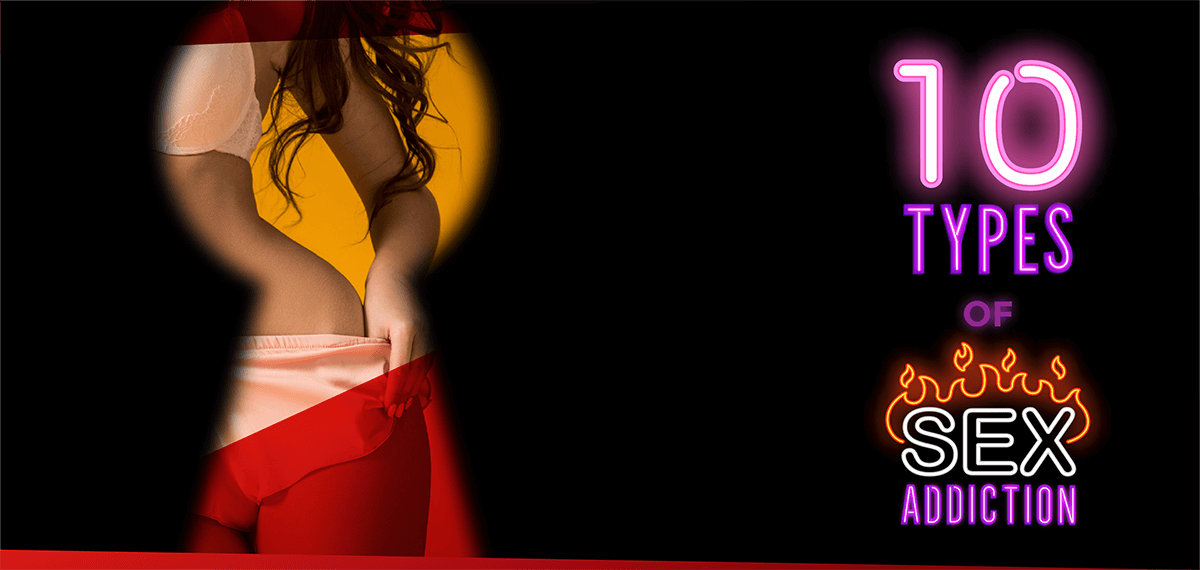One of only two addictions that don’t recommend abstinence as a method of recovery, sex addiction is a serious type of behavioural addiction with specific treatment needs. Knowing how to identify this complex addiction, and what’s needed for recovery, can help you or a loved one discover real intimacy.
Sexual impulses are a natural part of adult life and tend to signify a healthy libido. However, when these impulses become compulsive, frequent, and increasingly risky or taboo, they could suggest a more serious problem. If you’re feeling like you’ve lost control of your sexual urges, or that your sex drive is taking up a disproportionate amount of your day, you may be struggling with sex addiction.
What is Sex Addiction?
Sex addiction is a term used to describe an unhealthy psychological dependency on sex or sexually-related activity. Characterised by frequent sexual behaviour that is disruptive to one’s daily schedule, an increasing need for more extreme acts in order to achieve sexual satisfaction, and feelings of shame, emptiness or depression afterwards, sex addiction is a serious but treatable condition that can affect people of any gender.
Understanding the different forms of sex addiction
Sex addiction doesn’t only manifest as frequent sexual intercourse with a variety of partners. Other common types of sex addiction include:
- Masturbation
- Fantasising about sex
- Watching pornography
- Exhibition or voyeurism
- Prostitution
It’s important to note that simply engaging in any of these activities doesn’t signify a sex addiction, and other symptoms of hypersexuality must be present for these behaviours to be considered as part of a disorder.
While the term “sex addiction” is not identified in The Diagnostic and Statistical Manual of Mental Disorders (DSM-5), a psychology text that defines and categorises different types of mental health disorders like addiction, many of the signs and behaviours that are often linked to sex addiction are described under the medical diagnosis of compulsive sexual behaviour disorder (CSBD). Hypersexuality is another term that is also used to describe the impulsivity and behaviours associated with sex addiction. To diagnose someone with a sexual addiction-related disorder, a psychologist or other mental health professional will use an assessment tool, such as the Sexual Addiction Screening Test, to identify key signs.
How to Know if You Have a Sex Addiction
You love sex, spend time fantasising about it, and maybe even obsess over it a bit, especially with a new partner or if you’re not engaging in it as much as you’d like. Does that constitute a sex addiction?
If these thoughts or behaviours are disruptive to your day, increasingly graphic or taboo in nature, and/or accompanied by guilt, shame or other negative emotions, then it’s possible that you may be struggling with compulsive sexual behaviour, not just a healthy need for human sexual activity. Knowing the symptoms of sex addiction can help you define whether your relationship with sex is problematic.
Recognising signs of sex addiction
Signs of sex addiction can include things like:
- Loss of control over sexual impulses, even when you feel the need to stop
- Excessive and uncontrollable sexual urges
- Escalation of risky sexual behaviours in order to feel satisfaction
- Regular preoccupation with a sexual fantasy or plans for sexual encounters
- Feelings of shame, guilt, anxiety or depression about sexual behaviour
- Feelings of distress if you cannot engage in regular sexual activity
- Consequences to personal or professional relationships, health or financial stability as a result of uncontrolled sexual behaviour
What Causes Sex Addiction?
At this time, research has not identified a single cause of sex addiction. Like any other behavioural or substance addiction, hypersexuality appears to be influenced by a variety of biological, psychological, and social and environmental factors.
Biological factors
Some studies have suggested that differences in the frontal or temporal lobes of the brain may influence a tendency towards hypersexuality, though this does not definitively cause compulsive sexual behaviour. Other research has found that an imbalance in the levels of the feel-good neurotransmitter dopamine may also factor into sex addiction. This neurotransmitter plays an important role in developing an addiction, as it is key in cultivating a reaction to pleasurable experiences (such as sex), and can spur cravings for more.
Psychological factors
Trauma is a common theme amongst those struggling with sex addiction, with many coming from dysfunctional families where they may have experienced some type of childhood abuse or neglect, or were in close proximity to alcoholism or other substance use disorders. Sex addiction may develop in part to try to cope with the lingering effects of this trauma.
Mental disorders like major depressive disorder and anxiety, or mood disorders like bipolar disorder can also feed into hypersexuality. Chemical substance use disorders, especially those related to methamphetamine, cocaine or alcohol, may also influence compulsive sexual behaviour.
Social and environmental factors
Being exposed at an early age to explicit content, or being in frequent association with family or friends who have unhealthy relationships to sex, can influence hypersexuality. Social isolation can also feed into sex addiction, as individuals yearn for connection but lack the skills or models necessary to develop a healthy form of human sexuality.
How Does Sex Addiction Impact Relationships?
Compulsive sexual behaviour disorder can have a devastating impact on relationships or marriage, eroding trust, impacting financial stability, and if there is physical infidelity, potentially exposing an intimate partner to sexually transmitted infection or disease.
Additionally, as a loved one sinks further into an addiction, communication often breaks down as they attempt to cover up or deny their behaviour. This can result in serious emotional pain for both partners, and a sense of betrayal and potentially a loss of self-esteem for the partner affected by the actions of the other.
Could someone you love have a sex addiction?
Sex addiction is often accompanied by complicated feelings not only in the person suffering from it, but their partner or other loved ones. Feelings of shock, jealousy, distrust or outrage on the part of a loved one can obfuscate the identification of the behaviour as part of a disorder. Some signs that a loved one may be struggling with sex addiction include things like:
- Signs of compulsive sexual behaviour, i.e. frequent masturbation, pornography-driven search history, repeated trips to strip clubs, etc.
- Increasing secrecy, irritability, and moodiness
- Loss of interest in non-sexual activities
- Feeling ashamed or depressed before, during or after sex
- Engaging in sexual activities that are risky, taboo or illegal
If you have noticed these sex addiction signs in a loved one, it’s important to talk to them about getting help. Reaching out to a therapist first can give you the support you need in helping a loved one face this challenge, and assist you in knowing how to intervene most effectively.
Addressing Misconceptions About Sex Addiction
Misconception 1: The concept of sex addiction is really just a way to justify unorthodox or problematic sexual behaviour
There is a common misconception that sex addiction is a way for people to explain problematic or hurtful behaviour without being accountable for their actions. Often it’s suggested that people can control their behaviour, but simply don’t want to be blamed or take responsibility for it. In fact, sex addiction is characterised by compulsive behaviour that is extremely difficult to control, and typically results in shame and guilt for the person struggling with the addiction. It’s also important to acknowledge that people who recognise that they have a sex addiction and are taking steps to address it are being accountable for their behaviour.
Misconception 2: People with sex addiction engage in criminal sexual behaviours
Having a sex addiction doesn’t mean that you’re guaranteed to engage in illicit or immoral sexual activity. Not all people who commit crimes of a sexual nature have a sex addiction, and not all people with a sex addiction participate in criminal behaviour. In fact, some people with sex addiction may compulsively fill their time with fantasies and masturbation, but not participate in sex acts with others. Like any addiction, the manifestation of sex addiction can vary greatly from person to person, which is why personalised treatment is necessary in helping to successfully overcome it.
Misconception 3: Sex addiction is fun or pleasurable
There’s a massive difference between enjoying physical intimacy and embracing sex positivity, and being addicted to sex. Sex addiction involves compulsive and often risky or taboo behaviour that leaves people feeling guilty, ashamed and depressed by their actions. In fact, the way the behaviour makes a person feel combined with the ability to control sexual impulses are key indicators that someone has a problem with sex addiction.
How to Overcome Sex Addiction
Compulsive sexual behaviour disorder, like many other mental health conditions, can be difficult to diagnose. This is why seeking help from a medical professional is essential in understanding what you’re facing and what the most effective treatment options are. Fortunately, there are many therapeutic modalities that are effective in treating sex addiction.
How to treat sex addiction
Psychotherapy is the typical starting point for treating sex addiction, with a variety of different types of therapy available depending on each individual case. This is available at sex addiction treatment centres, or accessible in outpatient therapy sessions. Some common methods include:
- Cognitive behavioural therapy (CBT) – a popular form of talk therapy used to help people overcome addiction. CBT identifies the root causes of sex addiction, explores problematic patterns of thought and behaviour, and elicits ways in which to constructively address and shift these patterns.
- Psychodynamic therapy – this talk therapy works through the connections between past experience, such as childhood, and the client’s current problems or outlook.
- Trauma-informed therapy – this type of therapy works to specifically understand the consequences of trauma in order to promote a full, lasting recovery from mental health disorders and addiction. This combines trauma-focused approaches with cognitive behavioural therapies to explore and address the impacts of trauma.
- Couples therapy – targeted specifically towards building healthy relationships, couples therapy aims to increase mutual cognition, respect, intimacy and affection between partners through improved communication. This may also include sex therapy.
Depending on what a doctor or other mental health professional believes are the causes of hypersexuality, medication may be introduced alongside sex addiction therapy in order to help alleviate symptoms and potentially regulate hormones.
Support groups can also be very helpful for those in sex addiction rehab, and can be used as an additional resource in recovery. Groups like Sex Addicts Anonymous (SAA) or Sex and Love Addicts Anonymous (SLAA) provide 12-step programmes to help people recover from hypersexuality. Group psychotherapy sessions allow people to share their experiences with people who have been through similar situations and truly understand the impacts of their addiction. Support groups act as a safe space to talk about triggers, fears, and successes in recovery.
If you or a loved one is experiencing serious physical or mental health impacts as a result of sexually compulsive behaviour, or are considering illegal acts as a means of sexual gratification, it is important to reach out for professional help immediately.
Moving Past Sex Addiction at The Dawn

At The Dawn Wellness Centre and Rehab, we offer compassionate, holistic treatment for sex addiction as well as co-occurring disorders. The Dawn employs a unique recovery model, balancing a programme of effective psychotherapies with regular wellness practices like yoga, meditation, and strength training to address root causes of addiction and heal both the mind and body.
Our internationally-trained team of specialists will work closely with you from the moment you arrive to develop a customised treatment plan built towards your specific needs and goals.
Sex addiction treatment in Thailand
Located in beautiful Northern Thailand, our centre features stunning grounds with lush gardens, a swimming pool, and gorgeous architecture designed to inspire calm and reflection. You’ll find the space to relax and recover with all the comforts of home, but a world away from the triggers and stressors that exacerbate your condition. Call us today to learn more about how The Dawn can support you in overcoming sex addiction and living a healthier life.
Related Posts
 Getting to Know the Ten Types of Sex Addiction
Defining a sex addiction is not as straightforward as you might think. Understanding the different manifestations of this disorder can help you know if you might be struggling with a...
Getting to Know the Ten Types of Sex Addiction
Defining a sex addiction is not as straightforward as you might think. Understanding the different manifestations of this disorder can help you know if you might be struggling with a...
 What You Need to Know about Personality Disorders and Sex Addiction
Sex addiction is a common occurrence among individuals with established personality disorders, especially borderline personality disorder and bipolar disorder. Sex addiction is a term used to describe a type of behavioural addiction that...
What You Need to Know about Personality Disorders and Sex Addiction
Sex addiction is a common occurrence among individuals with established personality disorders, especially borderline personality disorder and bipolar disorder. Sex addiction is a term used to describe a type of behavioural addiction that...
 Harvey Weinstein’s Sex Addiction: An Excuse or Reality?
Harvey Weinstein claims he is suffering from sex addiction. Are you surprised? Yet another rich, influential man is receiving sex addiction counselling after over fifty women accused Weinstein of sexual...
Harvey Weinstein’s Sex Addiction: An Excuse or Reality?
Harvey Weinstein claims he is suffering from sex addiction. Are you surprised? Yet another rich, influential man is receiving sex addiction counselling after over fifty women accused Weinstein of sexual...
 What Causes Sex Addiction? Is it Genes, Trauma or Social Media?
More and more people are coming out with and seeking treatment for sexual dependency. Are evolving genes to blame? Social media influences? Too much access or not enough? Read on to...
What Causes Sex Addiction? Is it Genes, Trauma or Social Media?
More and more people are coming out with and seeking treatment for sexual dependency. Are evolving genes to blame? Social media influences? Too much access or not enough? Read on to...





